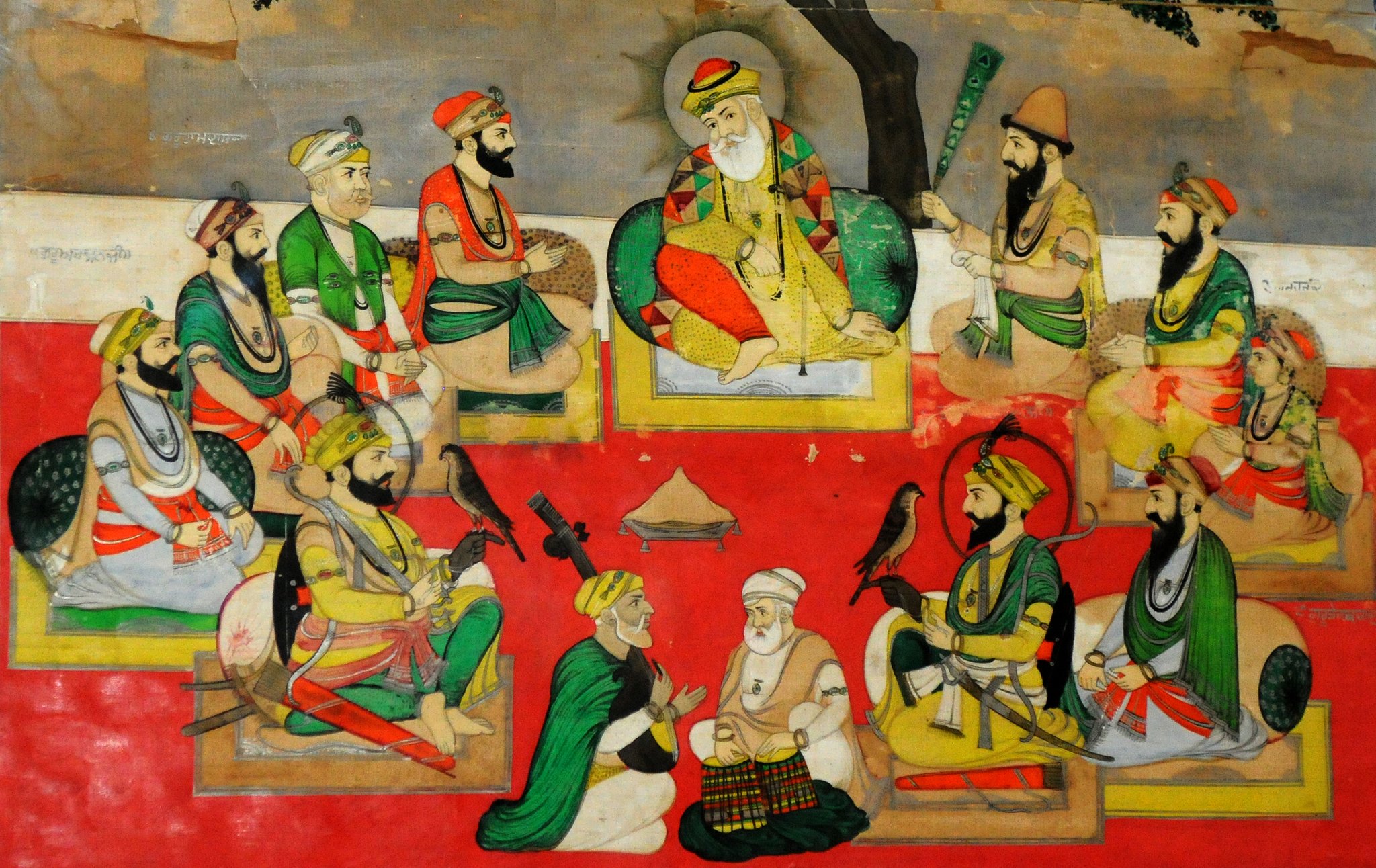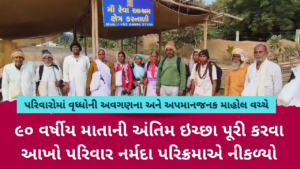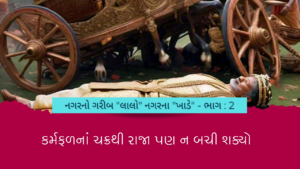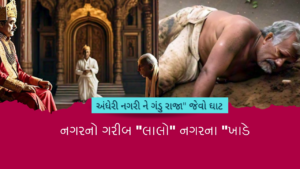India is well-known for its rich diversity. It has always been a place where many cultures and religions have coexisted. The country is home to a wide range of cultural structures that reflect the cultural legacy of our nation.
India has a diverse religious history in addition to having so many different religions. Sikhism, the fifth-largest religion in the world, is one of the faiths practised in India. As the founder of ‘Sikhism,’ the first Sikh guru, Guru Nanak Dev, had a significant impact on religion. The notion of “equality for all, regardless of religion, race, or gender” was something Guru Nanak Dev consistently taught.
Nanak’s life
 In the Pakistani Punjab province’s Talwandi village, presently known as Sri Nankana Sahib, Guru Nanak Dev was born in 1469. Father Kalu Ji and mother Tripta Ji are Guru Sahib’s parents. In the form of the Divine Word, he composed over 1000 hymns that are included in Sri Guru Granth Sahib. Bhai Mardana Ji, who played a string instrument known as ‘Rabab’, travelled with Guru Nanak. The following two meanings of the name Nanak also correspond to the traits possessed by Guru Nanak Dev.
In the Pakistani Punjab province’s Talwandi village, presently known as Sri Nankana Sahib, Guru Nanak Dev was born in 1469. Father Kalu Ji and mother Tripta Ji are Guru Sahib’s parents. In the form of the Divine Word, he composed over 1000 hymns that are included in Sri Guru Granth Sahib. Bhai Mardana Ji, who played a string instrument known as ‘Rabab’, travelled with Guru Nanak. The following two meanings of the name Nanak also correspond to the traits possessed by Guru Nanak Dev.
N + An + Ak = The Being without pain
N + Anak = Without Diversification
During his life, Nanak founded the cities of Kartarpur Sahib and Dera Baba Nanak. Today marks Guru Nanak Dev’s 484th death anniversary.
The ‘Langar’ pratha
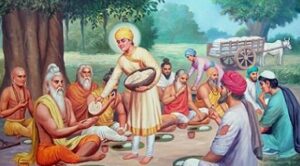 Serving others, in the eyes of Guru Nanak Dev, was serving God. Young Nanak had once received funding from his father to launch a business. However, he decided to use this cash to provide food for starving ascetics. This is what Nanak refers to as the “true trade,” and he established the ‘Langar’ custom, which is still practised today all across the world. We should only devour after we have shared with others, according to Guru Nanak. The goal of a Sikh is to meet everyone’s basic requirements, such as food, housing, and freedom to all humans putting aside the differences on the basis of caste, religion and gender.
Serving others, in the eyes of Guru Nanak Dev, was serving God. Young Nanak had once received funding from his father to launch a business. However, he decided to use this cash to provide food for starving ascetics. This is what Nanak refers to as the “true trade,” and he established the ‘Langar’ custom, which is still practised today all across the world. We should only devour after we have shared with others, according to Guru Nanak. The goal of a Sikh is to meet everyone’s basic requirements, such as food, housing, and freedom to all humans putting aside the differences on the basis of caste, religion and gender.
Elites and empty rituals

In politics, religion, and society, Guru Nanak opposed the injustice that was reinforced by people belonging to the higher authority. By criticising exclusive rights for the affluent and elite, he demonstrated that anybody can make a connection to the One (ek onkar). He was once sent to jail for denouncing the brutal Mughal emperor Babur. Guru Sahib advocated for a genuine and meaningful relationship to the divine via love as opposed to the customary empty rituals.
‘Gurbani’ for the day
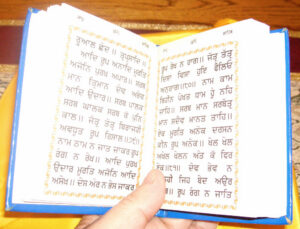 The Guru’s remarks include heavenly revelation. In the form of holy poetry, Guru Nanak praised the holy ‘One’; this poetry was then put into Sri Guru Granth Sahib (the everlasting Sikh scriptural Guru). The musical measures known as ‘Raag’ are used to sing these hymns. ‘Gurbani’ has great spiritual power and has the ability to change people’s life. Every morning and evening, he would assemble people to sing praises to the ‘One’.
The Guru’s remarks include heavenly revelation. In the form of holy poetry, Guru Nanak praised the holy ‘One’; this poetry was then put into Sri Guru Granth Sahib (the everlasting Sikh scriptural Guru). The musical measures known as ‘Raag’ are used to sing these hymns. ‘Gurbani’ has great spiritual power and has the ability to change people’s life. Every morning and evening, he would assemble people to sing praises to the ‘One’.
Social empowerment
Regardless of one’s gender, sexual orientation, race, or religion, everyone possesses the light of the ‘One’. The connection to the ‘One’, which is possible for everyone, is true empowerment. Guru Nanak uplifted those who were previously viewed as inferior, such as women. According to Guru Sahib, a person’s ideas, speech, and deeds matter. He preferred simple meals made with love by a modest carpenter over the lavish meals served by a dishonourable monarch.
Spreading the message
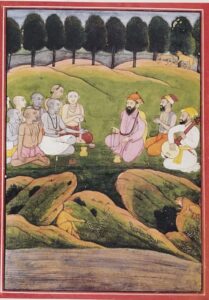 To convey his message of love and truth, he had travelled to many countries. He urged people to live humbly and to let go of their egos. While on these journeys, Guru Nanak spoke to many spiritual communities who were seeking for the ultimate truth. Many of them were motivated by his teachings and deeds to become ‘Gursikhs’ (Sikhs of the Guru). One of them, Bhai Lehna Ji, later rose to prominence as Guru Angad Dev, the second Guru. Though the light of Guru Nanak Dev continues to shine even today.
To convey his message of love and truth, he had travelled to many countries. He urged people to live humbly and to let go of their egos. While on these journeys, Guru Nanak spoke to many spiritual communities who were seeking for the ultimate truth. Many of them were motivated by his teachings and deeds to become ‘Gursikhs’ (Sikhs of the Guru). One of them, Bhai Lehna Ji, later rose to prominence as Guru Angad Dev, the second Guru. Though the light of Guru Nanak Dev continues to shine even today.

